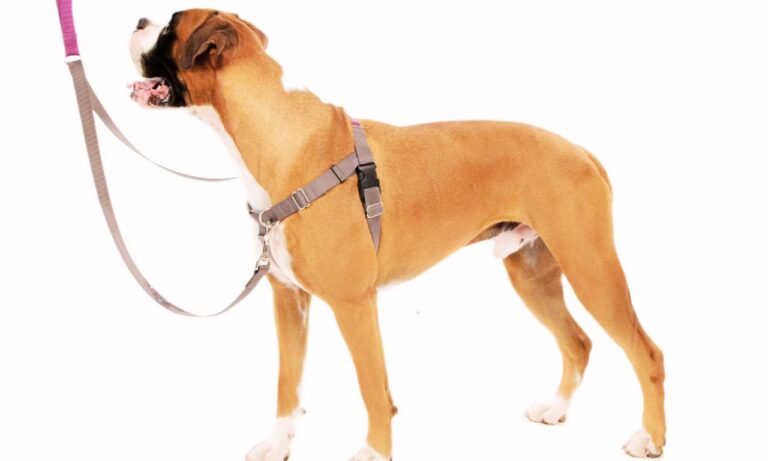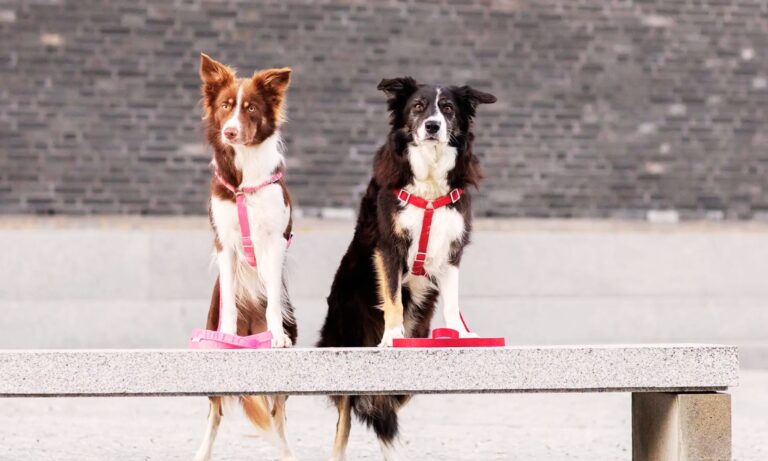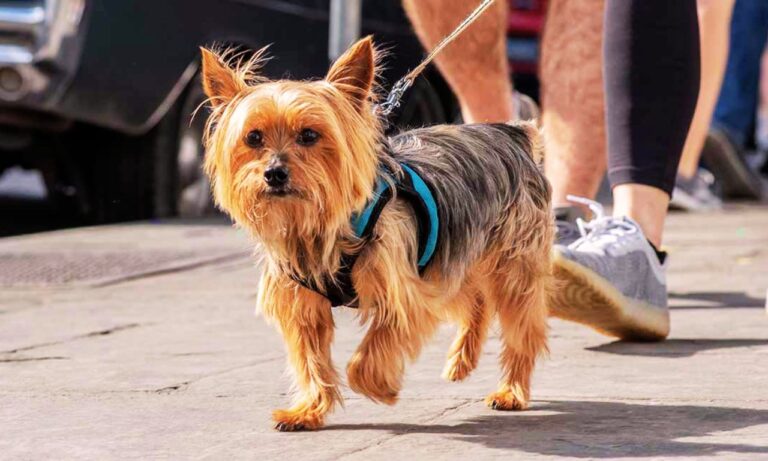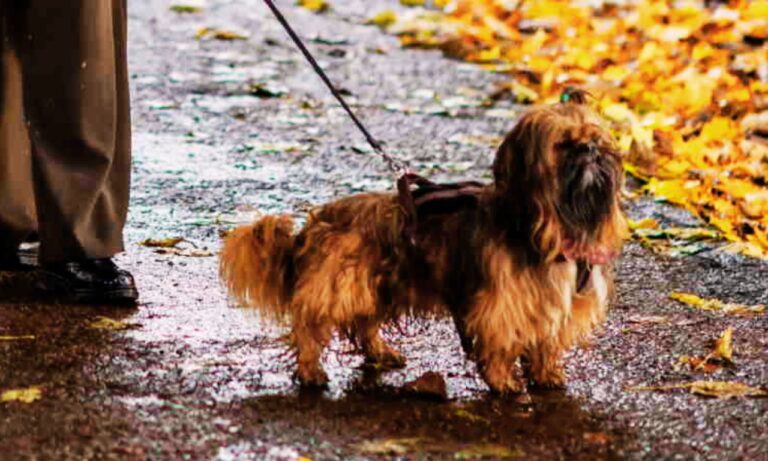Selecting the right collar size for your Rottweiler is essential for both their safety and comfort. Rottweilers are large, powerful dogs, so a well-fitted, sturdy collar is necessary to ensure control and avoid potential injuries. So, What size collar for Rottweiler? Understand if the Cane Corso is a high-maintenance dog with this insightful guide.
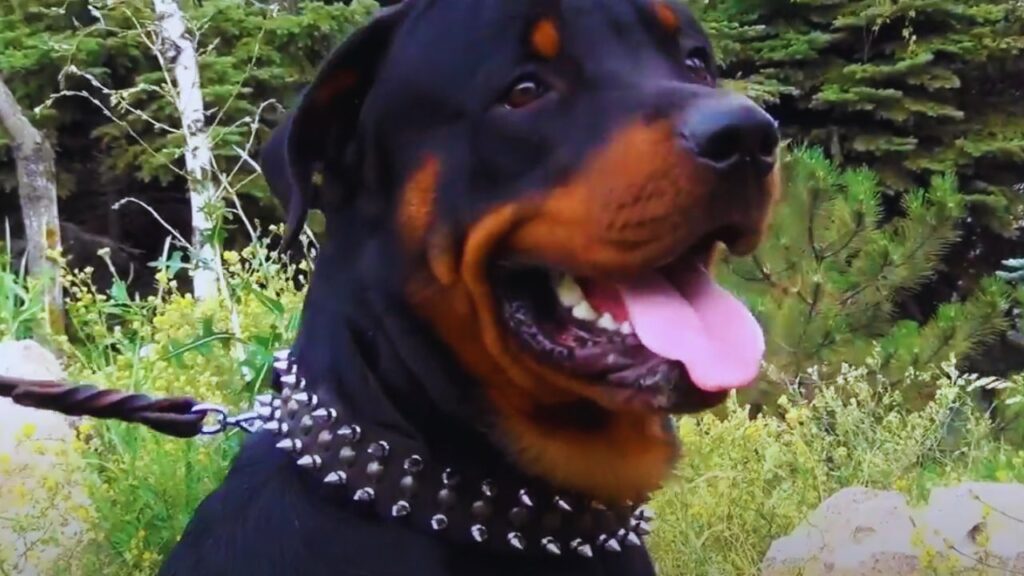
This blog explores the ideal collar size for a Rottweiler, key considerations when choosing one, and tips to help you make the best decision for your beloved companion. Find out what color collar looks best on a Rottweiler to complement their bold appearance and highlight their unique features.
Blog Highlights
ToggleWhat Size Collar for Rottweiler?
So, What size collar for Rottweiler? A fully grown Rottweiler typically requires a collar size between 18 to 30 inches, depending on their neck size. It’s important to add 1-3 inches for comfort and ensure the collar fits snugly with the two-finger rule for safety and control.
Here’s a simple collar size table for Rottweilers:
Note: Always measure your Rottweiler’s neck and add 1-3 inches for comfort and a proper fit.
Measuring Your Rottweiler’s Neck Size
To choose the perfect collar for your Rottweiler, the first step is accurately measuring their neck size. Fully grown Rottweilers typically have necks ranging from 18 to 30 inches (46 to 76 cm) due to their muscular build. Here’s how to get the right fit:
- Use a soft tape measure: Place the tape measure around your dog’s neck where the collar will sit, typically just above the shoulders.
- Add extra room: Add 1-3 inches to the measured neck size to ensure the collar is not too tight. This space allows room for movement and prevents choking, especially since Rottweilers tend to pull on the leash. The “two-finger” rule is a common guideline—if you can comfortably fit two fingers between the collar and the dog’s neck, the collar is likely a good fit.
Collar Types for Rottweilers
The right collar type varies based on your dog’s behavior, activity level, and training needs. Here are some of the most popular types of collars for Rottweilers:
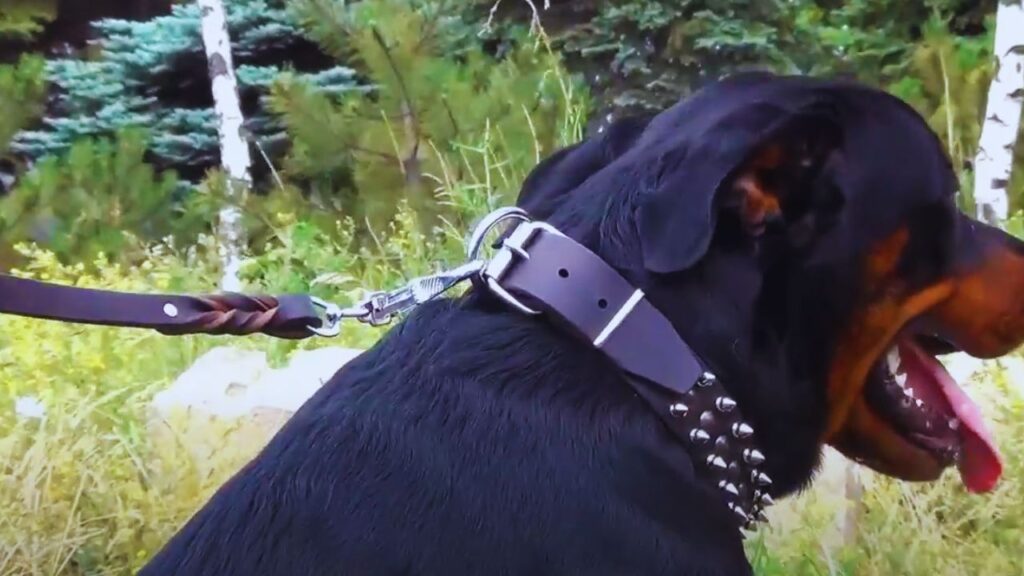
1. Leather Collars
Leather collars are a favorite among many Rottweiler owners because they are durable and strong, offering good control over the dog. High-quality leather is also comfortable and less likely to irritate the skin, making it ideal for daily use. Leather collars come in various sizes, typically starting from 1.5 to 2 inches in width, which distributes pressure evenly across your dog’s neck.
2. Martingale Collars
Martingale collars are designed to tighten slightly when the dog pulls, offering better control without choking them. This makes them ideal for leash training. These collars are often recommended for Rottweilers because of their wide necks and tendency to pull. Martingale collars typically range in size from 18 to 30 inches, with a wider width for added control.
3. Nylon Collars
Nylon collars are lightweight, durable, and come in a wide range of designs. Many nylon collars for Rottweilers also have added features like reflective stitching for nighttime visibility. However, they are generally less durable than leather or chain collars, making them more suitable for casual walks rather than high-energy activities.
4. Chain Collars
Chain collars, or choke collars, are used primarily for training purposes. While they can offer effective control, they should only be used with professional guidance to avoid injury. A high-quality chain collar made from rust-resistant materials is crucial for safety. Discover the best collars for short-haired dogs with these 6 top recommendations.
5. GPS Tracking Collars
For extra peace of mind, especially if your Rottweiler has a tendency to wander, consider a GPS collar. These collars allow you to track your dog’s location via a smartphone app, ensuring you never lose sight of them. GPS collars often come with additional features like activity tracking and LED lights for enhanced visibility.
Important Features to Consider For Rottweiler Collar
When selecting a collar for your Rottweiler, there are several features you should look for beyond just the size and material.

1. Adjustability
Since Rottweilers can vary greatly in size, an adjustable collar ensures a snug fit as your dog grows or gains weight. For puppies, start with a collar that can easily be adjusted to accommodate rapid growth.
2. Padding
Collars with soft padding provide extra comfort by reducing friction and preventing chafing, especially during longer walks or training sessions. Materials like neoprene or faux suede offer breathability and comfort without sacrificing durability.
3. Safety Features
Reflective collars or those with LED lights are essential if you walk your dog early in the morning or late at night. This increases visibility and keeps your Rottweiler safe from traffic or potential hazards. Quick-release buckles are another excellent feature for safety, allowing you to quickly remove the collar in emergencies.
4. Durability
Given the strength and activity level of Rottweilers, their collars need to be highly durable. Opt for collars resistant to wear and tear, such as those made from strong leather or double-stitched nylon, to ensure they last through rough play, water exposure, and dirt. Learn if it’s bad to leave a dog’s collar on all the time and how to ensure your pet’s comfort.
Common Mistakes to Avoid Selecting Rottweiler Collar
When selecting a collar for your Rottweiler, several common mistakes can compromise your dog’s safety or comfort:
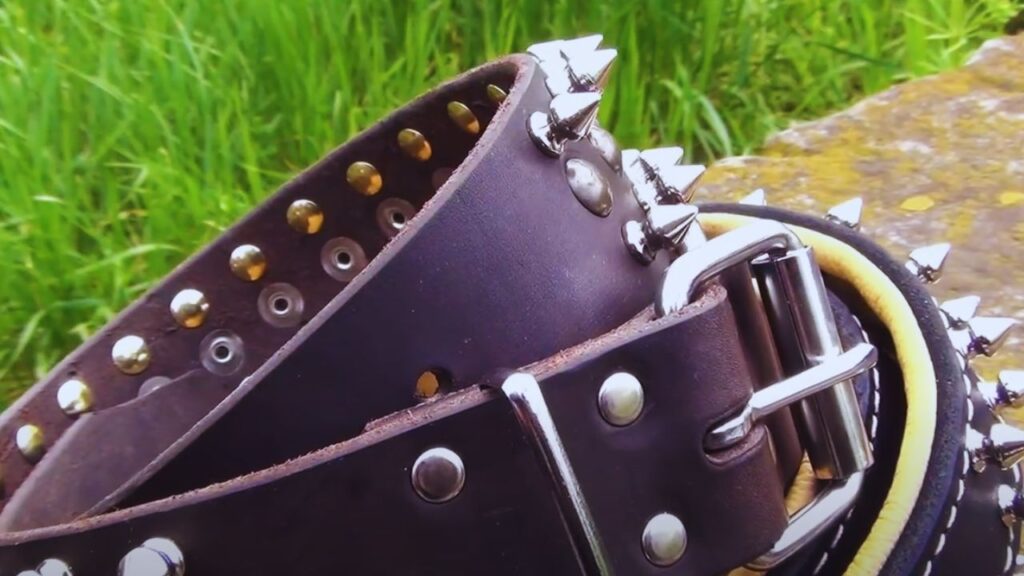
- Choosing the Wrong Size: A collar that’s too tight can choke your dog, while a loose collar can slip off. Always measure accurately and follow the two-finger rule to ensure a secure fit.
- Ignoring Adjustability: Puppies grow quickly, and a collar that fits today may be too tight in a few months. Choosing an adjustable collar helps accommodate growth without frequent replacements.
- Neglecting Comfort: Rottweilers have short coats, which can make them more prone to irritation from ill-fitting or poorly padded collars. Ensure that the collar material is soft against their skin.
- Overlooking Safety Features: Lack of reflective elements or weak buckle closures can be hazardous, particularly for night walks. Opt for collars with added safety measures.
Choosing the Best Material for Your Rottweiler’s Collar
When selecting a collar for your Rottweiler, choosing the right material is just as important as finding the correct size. The material can influence not only the comfort and durability of the collar but also its safety and how well it suits your dog’s lifestyle. Each material has its own pros and cons, depending on your Rottweiler’s daily activities, temperament, and environment.

1. Leather Collars: Durability and Comfort
Leather collars are a popular choice for Rottweilers due to their strength, durability, and classic look. High-quality leather is incredibly tough, which makes it ideal for large and strong dogs like Rottweilers. Leather collars tend to last longer than many other materials, especially if properly maintained with conditioning oils to prevent cracking.
A major advantage of leather collars is the comfort they offer. Over time, the leather softens and molds to the shape of your dog’s neck, making it a comfortable option for everyday wear. Unlike some synthetic materials, leather is less likely to cause skin irritation or chafing, which is especially beneficial for Rottweilers with sensitive skin. Find out whether collars are bad for a dog’s neck and fur and how to avoid common issues.
However, leather collars require more care than synthetic alternatives. They need to be cleaned and conditioned regularly to avoid damage from moisture, dirt, or extreme temperatures. While more expensive, leather collars are a worthwhile investment for Rottweiler owners looking for a durable, long-lasting collar.
2. Nylon Collars: Lightweight and Versatile
Nylon collars are lightweight, affordable, and come in a variety of colors and designs, making them a versatile option for Rottweilers. Nylon is a synthetic material that is resistant to water, making these collars a good choice for dogs that spend a lot of time outdoors or in water. They are also easy to clean, which can be convenient if your dog frequently gets dirty.
Despite being lighter and less expensive than leather, nylon collars are still strong enough to withstand the strength of a Rottweiler. However, because they are lighter, they may not be as durable as leather over the long term, especially with daily wear and tear.
Additionally, nylon collars can sometimes cause friction and matting of fur, especially in Rottweilers with shorter coats. To mitigate this, look for padded nylon collars that reduce friction and provide more comfort.
3. Chain and Metal Collars: Training and Control
Chain collars, such as choke or prong collars, are often used for training purposes, particularly for dogs that tend to pull on the leash. These collars are designed to tighten around the dog’s neck when they pull, providing a corrective pressure that discourages this behavior. For a strong and sometimes stubborn breed like the Rottweiler, these collars can offer more control during training sessions.
However, chain collars should only be used under professional guidance, as improper use can lead to injury or discomfort. They are generally not recommended for daily wear due to their potential to cause neck strain if not fitted correctly. Explore if mountain dogs are good pets and suitable for your home.
Wrapping Up!
Finding the right collar for your Rottweiler requires consideration of several factors, including neck size, collar material, and your dog’s activity level. Whether you’re using a leather collar for durability, a Martingale for training, or a GPS collar for peace of mind, ensuring the collar fits properly is key to your dog’s safety and comfort.
Regularly check and adjust the collar as needed, and don’t hesitate to seek professional advice if you’re unsure about the best option for your dog. With the right collar, your Rottweiler can enjoy secure, comfortable, and safe adventures at your side. Hope so, now you know what size collar for Rottweiler.


